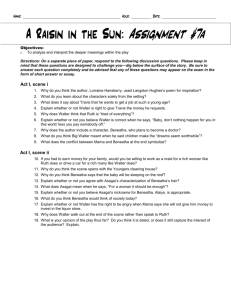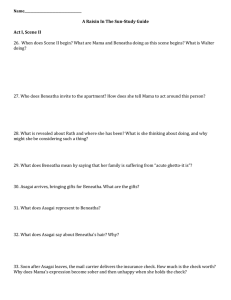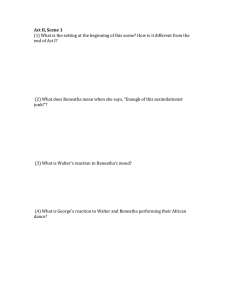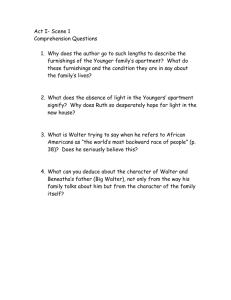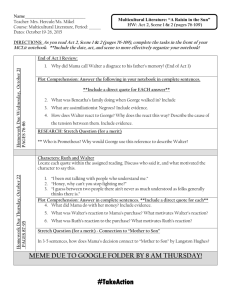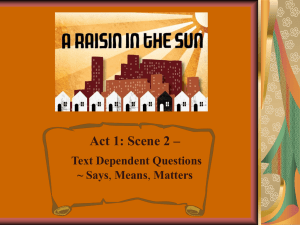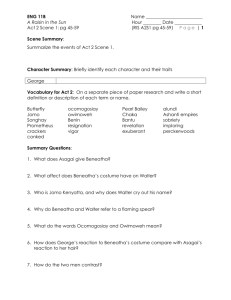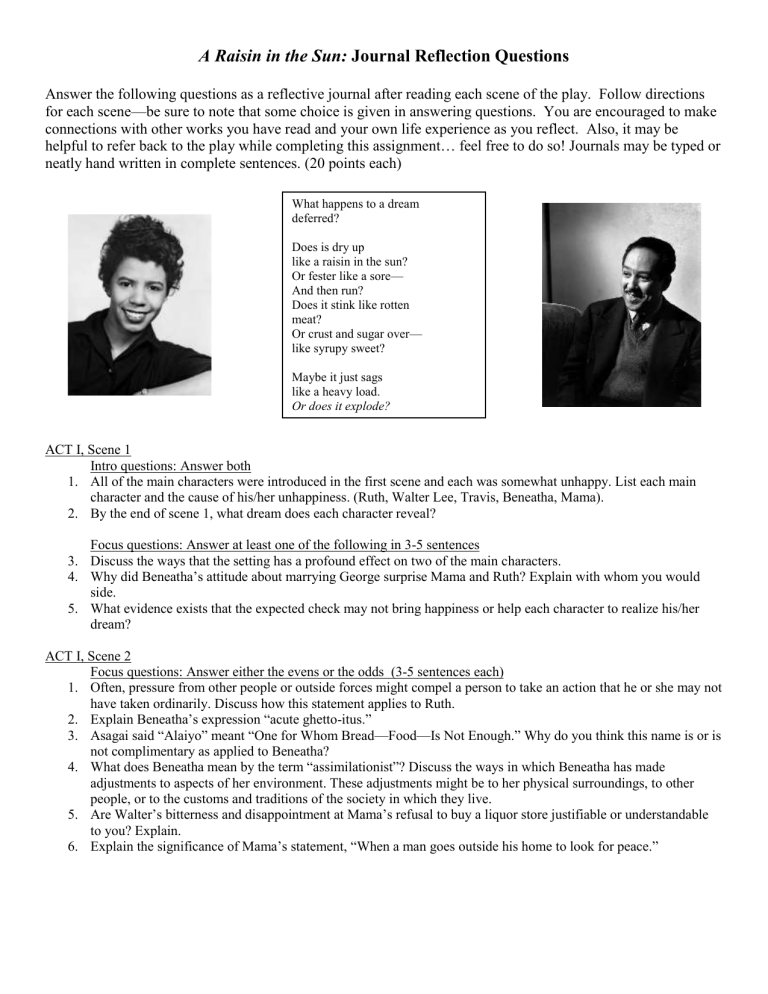
A Raisin in the Sun: Journal Reflection Questions Answer the following questions as a reflective journal after reading each scene of the play. Follow directions for each scene—be sure to note that some choice is given in answering questions. You are encouraged to make connections with other works you have read and your own life experience as you reflect. Also, it may be helpful to refer back to the play while completing this assignment… feel free to do so! Journals may be typed or neatly hand written in complete sentences. (20 points each) What happens to a dream deferred? Does is dry up like a raisin in the sun? Or fester like a sore— And then run? Does it stink like rotten meat? Or crust and sugar over— like syrupy sweet? Maybe it just sags like a heavy load. Or does it explode? ACT I, Scene 1 Intro questions: Answer both 1. All of the main characters were introduced in the first scene and each was somewhat unhappy. List each main character and the cause of his/her unhappiness. (Ruth, Walter Lee, Travis, Beneatha, Mama). 2. By the end of scene 1, what dream does each character reveal? Focus questions: Answer at least one of the following in 3-5 sentences 3. Discuss the ways that the setting has a profound effect on two of the main characters. 4. Why did Beneatha’s attitude about marrying George surprise Mama and Ruth? Explain with whom you would side. 5. What evidence exists that the expected check may not bring happiness or help each character to realize his/her dream? ACT I, Scene 2 Focus questions: Answer either the evens or the odds (3-5 sentences each) 1. Often, pressure from other people or outside forces might compel a person to take an action that he or she may not have taken ordinarily. Discuss how this statement applies to Ruth. 2. Explain Beneatha’s expression “acute ghetto-itus.” 3. Asagai said “Alaiyo” meant “One for Whom Bread—Food—Is Not Enough.” Why do you think this name is or is not complimentary as applied to Beneatha? 4. What does Beneatha mean by the term “assimilationist”? Discuss the ways in which Beneatha has made adjustments to aspects of her environment. These adjustments might be to her physical surroundings, to other people, or to the customs and traditions of the society in which they live. 5. Are Walter’s bitterness and disappointment at Mama’s refusal to buy a liquor store justifiable or understandable to you? Explain. 6. Explain the significance of Mama’s statement, “When a man goes outside his home to look for peace.” ACT II, Scene 1 Focus questions: Answer 4 of the following in (3-5 sentences each) 1. What is the difference between George and Beneatha’s feelings about their ethnic heritage? How is this difference important? 2. Explain why Walter and George dislike each other. 3. What did George mean by calling Walter Prometheus? (Your dictionary can help with this one) 4. What does this scene, up to Mama’s entrance, reveal about the often concealed feelings between Ruth and Walter? 5. Mama said, “My—them steps is longer than they used to be.” What do the steps suggest about her dream? 6. Contrast the reactions of Ruth and Walter to the prospect of moving into a new home. 7. Can you justify, at all, Walter’s remarks to his mother as the scene closes? Explain why or why not. ACT II, Scene 2 Focus questions: Answer 3 of the following (3-5 sentences each) 1. A person can be lonely if his/her ideas, feelings, or circumstances are different from those around them. Discuss how Beneatha experiences loneliness because of the differences in her ideas, feelings, or circumstances. 2. How does Ruth find out that Walter has not been to work for three days? What has Walter been doing instead of going to work? 3. When Walter tells Travis that he wants to hand him the world, what sort of life is Waiter envisioning for his family? 4. Why did Mama turn over the remainder of her money? As you finish reading the scene, did you feel that this was a wise thing for Mama to do? ACT II, Scene 3 Focus questions: Answer either the evens or the odds (3-5 sentences each) 1. Why does Mr. Lindner come to the Youngers' apartment? 2. Why don't the residents of Clybourne Park want the Youngers in their neighborhood? 3. Explain Beneatha’s line: “Thirty pieces and not a coin less.” 4. What is significant about Mama's preparing her plant for the move as she listens to the details of the encounter with Lindner? 5. Why did Walter hug Mama “with all his strength”? 6. Explain Walter’s speech: “Cause sometimes it’s hard to let the future begin.” ACT III Focus questions: Answer either the evens or the odds (3-5 sentences each) 1. What was the basis for Beneatha’s desire to become a doctor? What does this show about her character? Why has she now changed he thinking about the future? 2. What is your opinion of Asagai’s dream for his life? What does it show about his character? 3. Up until now, Ruth has been the practical one. How does she react to Mama's resignation? 4. Why did Mama oppose Walter’s plan to accept Lindner’s offer? 5. Explain Mama’s speech, which begins, “There is always something left to love.” 6. What words of Walter mark his finest moment in the play? 7. Why did Lorraine Hansberry (the author) have Beneatha and Walter go out quarreling at the end? 8. What did Mama express by her actions when she was left alone on the stage at the end? CRUCIAL QUESTIONS TO THE PLAY AS A WHOLE: 1. What is the theme of the play? 2. Where is the climax of the play? 3. Why is the play divided into six scenes? Is there a minor climax in each scene? Does each end in a way that makes the reader (or the audience) want to see what is coming next? 4. Are there any unnecessary characters or scenes? 5. Where do you find humor in the play? 6. Are the main characters essentially good people? Whom do you admire the most? Least? 7. At the end have the Youngers been defeated, or have they triumphed?
